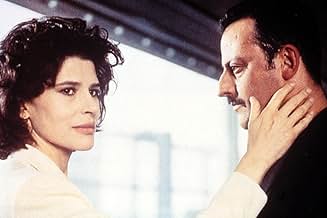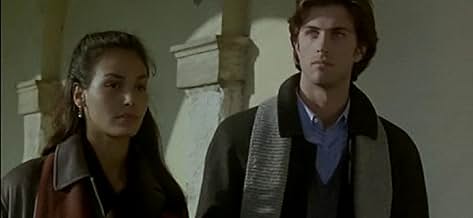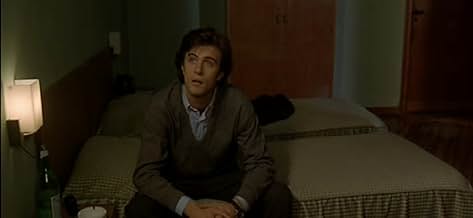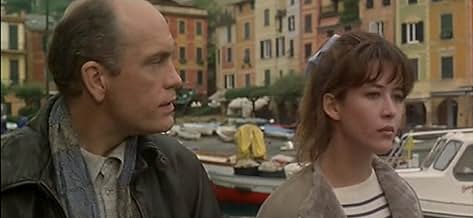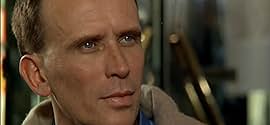IMDb RATING
6.4/10
6.4K
YOUR RATING
Four stories about short or long relationships between men and women in Italy and France.Four stories about short or long relationships between men and women in Italy and France.Four stories about short or long relationships between men and women in Italy and France.
- Awards
- 3 wins & 6 nominations total
Kim Rossi Stuart
- Silvano
- (as Kim Rossi-Stuart)
Inés Sastre
- Carmen
- (as Ines Sastre)
Featured reviews
Even though the story is light, the movie flows so beautifully and its visual so tranquil and poetic that it could almost carry the whole movie.
The film consists of four interconnected stories, all about different aspect of attraction between man and/or woman and how it frequently is ethereal. Their true desire seems to be always something that they cannot hold onto, it will flow out like a handful of sand.
I thought the most intriguing story was the last one where the more unattainable the woman was, the more the man desires her. It parallels her deep love for god, who is infinitely out of reach, but never closer to her heart.
A very good movie. 7/10
The film consists of four interconnected stories, all about different aspect of attraction between man and/or woman and how it frequently is ethereal. Their true desire seems to be always something that they cannot hold onto, it will flow out like a handful of sand.
I thought the most intriguing story was the last one where the more unattainable the woman was, the more the man desires her. It parallels her deep love for god, who is infinitely out of reach, but never closer to her heart.
A very good movie. 7/10
I was stunned by this film. I have been renting Antonioni's films/rediscovering them, and this film showed me the climax and fruits of his 50 years of directing. What an eye for setting, color, and detail! I have never seen such visual beauty and poetry filmed before. I had to stop after the first story and hold back the tears. Yes, beauty moves me, like it moved Keats to write Ode on a Grecian Urn. This movie is made for the mature, emotionally and intellectually, audience. Those hoping to see physical action and soap opera will be disappointed. I will have to see this film several times before I can truly appreciate it and judge it. This film should be required viewing for all cinematographers and directors.
Possibly a truly great film, on the order of Kurosawa's Dreams.
Possibly a truly great film, on the order of Kurosawa's Dreams.
Michelangelo Antonioni is one of the major figures of cinema history, even if most people haven't heard of him. He was nowhere near as prolific as filmmakers such as Fellini, Godard, Bergman, Kurosawa, or Truffaut. And his films now are difficult to procure. There are only a few readily available, and I have seen all of those but one (Il Grido, which has recently been released on DVD by Kino). Four of the five Antonioni films that I've seen, L'Avventura, Red Desert, Blowup, and The Passenger are among the best films ever made. One other that I've seen, L'Eclisse, I think probably is also to be included among them; if only the video that I saw would not have been so horribly defiled! Now I have seen Beyond the Clouds.
I had always heard that it was a great failure, but it was difficult to lower my expectations of Antonioni. Wim Wenders' presence did not help, either. Throughout the film, there were many things that annoyed me, and also many things that I loved. I think a pros/cons list will help here.
Cons:
1. The writing seems weak. All the stories told have little depth, it seems, and we find out almost nothing about anybody we meet in the picture. Usually, Antonioni's writing can be used to show just how well a film can be written, and his characters are the definition of "complex." But in another way I can also see the style of writing presented here in a more positive light, which I'll comment on later.
2. The acting is really weak. I cannot in any way defend it. There is not one performer who isn't subpar here, and most of the actors are second-rate actors in the first place (Irene Jacob excepted). John Malkovich is one of the hammiest actors who's ever lived. The only thing I ever liked him in was Being John Malkovich, because that film delightfully (and, apparently, unnoticeably, at any rate by Malkovich himself) mocked his very pretensions, which are in full force in this film.
3. Casual nudity - okay, no one on Earth wants to see John Malkovich buck naked. Fortunately, if you are a fan of female nudity, nearly every woman in the film, including Bond girl Sophie Marceau, appears naked from head to foot with everything in between (sorry, Irene Jacob fans, no nudity from her!). I myself don't mind nudity when it is called for, like in Last Tango in Paris, but the rampant nudity in this film makes it seem like European softcore along the lines of Emmanuel. Actually, the softcore it really reminded me of was Red Shoe Diaries. The light jazz by Van Morrison just adds to this effect. Antonioni was once a proto-feminist. Many of his most famous films were from a distinctly female point of view. And when men did take over in his films, they were very unlikable. Here, the women are often exploited.
Pros:
1. Cinematography - okay, we have two of the best visual directors of all time working on this film, the cinematography ought to be outstanding. It is, generally. There are a couple of visual moments that are absolutely spectacular, some of the best I've ever seen. This includes an ethereal scene where Malkovich explores a deserted playground on a beach. He sits on a swing, spins around in it with a shot that involves a beautifully moving camera, and then we watch a strong wind blow sand around on the beach (Antonioni loves showing the wind in his films). Another great visual scene involves a camera gliding about a spiral staircase near the end of the film.
2. Mood - The nonchalant flow of the narrative actually adds a lot of mood. The title of the film is entirely appropriate. You do feel as if you're witnessing something beyond the clouds. Certain stories are left in suspension, never to be resolved, and it feels right. By the final scene, Beyond the Clouds had nearly won me over. Still, there were too many things wrong with it to suggest it to non-Antonioni fans, but Antonioni fans owe it to themselves to see it once. 6/10
I had always heard that it was a great failure, but it was difficult to lower my expectations of Antonioni. Wim Wenders' presence did not help, either. Throughout the film, there were many things that annoyed me, and also many things that I loved. I think a pros/cons list will help here.
Cons:
1. The writing seems weak. All the stories told have little depth, it seems, and we find out almost nothing about anybody we meet in the picture. Usually, Antonioni's writing can be used to show just how well a film can be written, and his characters are the definition of "complex." But in another way I can also see the style of writing presented here in a more positive light, which I'll comment on later.
2. The acting is really weak. I cannot in any way defend it. There is not one performer who isn't subpar here, and most of the actors are second-rate actors in the first place (Irene Jacob excepted). John Malkovich is one of the hammiest actors who's ever lived. The only thing I ever liked him in was Being John Malkovich, because that film delightfully (and, apparently, unnoticeably, at any rate by Malkovich himself) mocked his very pretensions, which are in full force in this film.
3. Casual nudity - okay, no one on Earth wants to see John Malkovich buck naked. Fortunately, if you are a fan of female nudity, nearly every woman in the film, including Bond girl Sophie Marceau, appears naked from head to foot with everything in between (sorry, Irene Jacob fans, no nudity from her!). I myself don't mind nudity when it is called for, like in Last Tango in Paris, but the rampant nudity in this film makes it seem like European softcore along the lines of Emmanuel. Actually, the softcore it really reminded me of was Red Shoe Diaries. The light jazz by Van Morrison just adds to this effect. Antonioni was once a proto-feminist. Many of his most famous films were from a distinctly female point of view. And when men did take over in his films, they were very unlikable. Here, the women are often exploited.
Pros:
1. Cinematography - okay, we have two of the best visual directors of all time working on this film, the cinematography ought to be outstanding. It is, generally. There are a couple of visual moments that are absolutely spectacular, some of the best I've ever seen. This includes an ethereal scene where Malkovich explores a deserted playground on a beach. He sits on a swing, spins around in it with a shot that involves a beautifully moving camera, and then we watch a strong wind blow sand around on the beach (Antonioni loves showing the wind in his films). Another great visual scene involves a camera gliding about a spiral staircase near the end of the film.
2. Mood - The nonchalant flow of the narrative actually adds a lot of mood. The title of the film is entirely appropriate. You do feel as if you're witnessing something beyond the clouds. Certain stories are left in suspension, never to be resolved, and it feels right. By the final scene, Beyond the Clouds had nearly won me over. Still, there were too many things wrong with it to suggest it to non-Antonioni fans, but Antonioni fans owe it to themselves to see it once. 6/10
The worst segment in this very uneven sketch film is the first, a silly tale of abandonment featuring pretty boy Kim Rossi Stuart and the Lancôme model Inés Sastre. It reeks of chic and product placement. The second episode, with a bored-looking Sophie Marceau is hardly better; we can't care if she stabbed her dad six, twelve or 528 times. Sophie does have a lovely body, however, and the boutique she works in is elegant.
The triangle story is next, with Peter Weller playing a bilingual rich man with a wife (Fanny Ardant, sensational) and a mistress (Chiara Caselli, OK). Fanny's big scene has her smashing a vase then chewing out her straying hubby. She manages to be drunk, angry and horny all at once: I have never seen her act with such power. Pity that the little sequel with Jean Reno meeting Fanny in the empty apartment isn't very effective.
The last segment with Irène Jacob, a pretty girl with a big secret, is a little gem, but it feels tacked-on, not really a part of the picture.
The triangle story is next, with Peter Weller playing a bilingual rich man with a wife (Fanny Ardant, sensational) and a mistress (Chiara Caselli, OK). Fanny's big scene has her smashing a vase then chewing out her straying hubby. She manages to be drunk, angry and horny all at once: I have never seen her act with such power. Pity that the little sequel with Jean Reno meeting Fanny in the empty apartment isn't very effective.
The last segment with Irène Jacob, a pretty girl with a big secret, is a little gem, but it feels tacked-on, not really a part of the picture.
Although I'm a big fan of his work, and specially his revolutionary masterpieces, I would say this film did not live up to my expectations regarding Antonioni's abilities. In one word, I found myself utterly bored. I could not bring myself to share any emotions with the characters (no matter how hard I tried) and finally gave up on watching it. Malkovich was poorly casted and instead of bringing warmth and real human emotions to the character, made it a drag and sometimes impossible to follow. There are no real links for this four short stories, and least of all Malkovich's ramblings and philosophical (attempts at best) remarks bordering on sunday sermons. If you want good quality film, better stick to the director's earlier works. Sorry!!!
Did you know
- TriviaIn order to obtain the covering insurance needed to put the film into production, Michelangelo Antonioni (who was still recovering from a severely debilitating stroke) had to agree to have a secondary director on staff, ready to take over from him at any time. His choice, Wim Wenders, even provided the prologue and epilogue for the film.
- Alternate versionsThere are two slightly different versions of the movie, the difference ocurring at the end. The US version of 'Beyond The Clouds' (Al di là delle nuvole, 1995) lacks the complete voice-over narration by John Malkovich's character at the end of the movie, from the moment he enters the hotel until the last image, before going to credits. The only line heard is: 'The director's profession is very peculiar...'; whereas the European cut of the movie contains a longer narration, also starting with the same line, but expanding until the last image before fading to credits. The voice-over talks about how the director's profession is to find images, only to discover another image beneath the previous one which is more faithful to the truth, and then another, and another, until you reach the one which equals reality, the one no one will ever see. Both versions are equally powerful in their own right, though it's interesting to note such a minor difference was made in the first place. Both versions are available, the US version was released in DVD, and the European version is available in VHS only.
- ConnectionsFeatured in Faire un film pour moi c'est vivre (1995)
- SoundtracksUnknown Love
Written by Lucio Dalla and Robert Sidoli
Performed by Giuseppe D'Onghia (as Beppe Donghia) (piano) and Lucio Dalla (clarin)
- How long is Beyond the Clouds?Powered by Alexa
Details
Box office
- Gross US & Canada
- $31,738
- Opening weekend US & Canada
- $12,596
- Dec 5, 1999
- Gross worldwide
- $31,738
- Runtime
- 1h 50m(110 min)
- Color
- Sound mix
- Aspect ratio
- 1.66 : 1
Contribute to this page
Suggest an edit or add missing content

